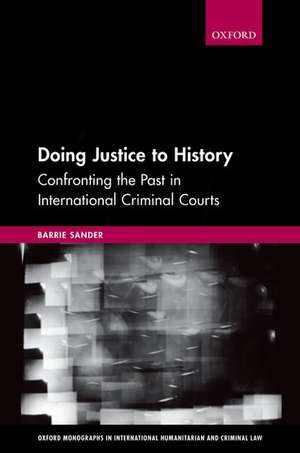Doing Justice to History: Confronting the Past in International Criminal Courts: Oxford Monographs in International Humanitarian & Criminal Law
Autor Barrie Sanderen Limba Engleză Hardback – 9 mar 2021
Din seria Oxford Monographs in International Humanitarian & Criminal Law
- 27%
 Preț: 701.23 lei
Preț: 701.23 lei - 6%
 Preț: 237.59 lei
Preț: 237.59 lei - 21%
 Preț: 594.62 lei
Preț: 594.62 lei - 21%
 Preț: 595.37 lei
Preț: 595.37 lei - 21%
 Preț: 594.28 lei
Preț: 594.28 lei - 12%
 Preț: 663.58 lei
Preț: 663.58 lei - 30%
 Preț: 660.15 lei
Preț: 660.15 lei - 30%
 Preț: 541.57 lei
Preț: 541.57 lei - 30%
 Preț: 598.73 lei
Preț: 598.73 lei - 30%
 Preț: 599.34 lei
Preț: 599.34 lei - 30%
 Preț: 863.92 lei
Preț: 863.92 lei - 28%
 Preț: 728.60 lei
Preț: 728.60 lei - 30%
 Preț: 701.56 lei
Preț: 701.56 lei - 26%
 Preț: 733.89 lei
Preț: 733.89 lei - 26%
 Preț: 629.86 lei
Preț: 629.86 lei - 16%
 Preț: 718.54 lei
Preț: 718.54 lei - 25%
 Preț: 642.57 lei
Preț: 642.57 lei - 30%
 Preț: 817.96 lei
Preț: 817.96 lei
Preț: 719.16 lei
Preț vechi: 835.40 lei
-14% Nou
Puncte Express: 1079
Preț estimativ în valută:
137.63€ • 143.16$ • 113.62£
137.63€ • 143.16$ • 113.62£
Carte disponibilă
Livrare economică 14-20 martie
Preluare comenzi: 021 569.72.76
Specificații
ISBN-13: 9780198846871
ISBN-10: 0198846878
Pagini: 384
Dimensiuni: 163 x 240 x 27 mm
Greutate: 0.73 kg
Editura: OUP OXFORD
Colecția OUP Oxford
Seria Oxford Monographs in International Humanitarian & Criminal Law
Locul publicării:Oxford, United Kingdom
ISBN-10: 0198846878
Pagini: 384
Dimensiuni: 163 x 240 x 27 mm
Greutate: 0.73 kg
Editura: OUP OXFORD
Colecția OUP Oxford
Seria Oxford Monographs in International Humanitarian & Criminal Law
Locul publicării:Oxford, United Kingdom
Recenzii
This book is a well-informed, meticulously researched and incessantly inquisitive contribution to what might be broadly characterised as the historiography of international criminal law. How do international criminal courts go about constructing historical narratives, how are these histories received and what happens to history after its encounter with international law, and international law after its encounter with history? By offering us a series of deft and sometimes pugnacious answers to these questions, Dr Sander enriches the field considerably.
In Doing Justice to History, Barrie Sander moves us well beyond familiar debates over whether international criminal courts (or any courts for that matter) should narrate history, by masterfully and compellingly demonstrating how international criminal courts not only produce but legitimate impoverished historical accounts. While largely skeptical of the many biases of international criminal law that manifest in its history-making, Sander also suggests the emancipatory potential of approaching the judicial production of history as a site of critical inquiry rather than as an end. Lawyers, historians, and social theorists interested in the law or memory of armed conflict, crimes against humanity, and genocide will want to read this book.
Milan Kundera writes that we 'pass through the present with our eyes blindfolded,' and it is only when that blindfold 'is untied' that we can 'glance at the past' and discover its meaning. In this book for the ages, Barrie Sander unties international criminal law's blindfold. Sander adroitly shows what sense law can, and cannot, make of history.
This book offers an astute account of how history is being constructed in international courtrooms. It shows how historical narratives by international criminal courts are neither static nor final, and it argues that international judgments should not be seen as historical endpoints but rather as discursive beginnings. The book is brilliant in its nuanced approach and convincing through its meticulous argumentation.
In Doing Justice to History, Barrie Sander moves us well beyond familiar debates over whether international criminal courts (or any courts for that matter) should narrate history, by masterfully and compellingly demonstrating how international criminal courts not only produce but legitimate impoverished historical accounts. While largely skeptical of the many biases of international criminal law that manifest in its history-making, Sander also suggests the emancipatory potential of approaching the judicial production of history as a site of critical inquiry rather than as an end. Lawyers, historians, and social theorists interested in the law or memory of armed conflict, crimes against humanity, and genocide will want to read this book.
Milan Kundera writes that we 'pass through the present with our eyes blindfolded,' and it is only when that blindfold 'is untied' that we can 'glance at the past' and discover its meaning. In this book for the ages, Barrie Sander unties international criminal law's blindfold. Sander adroitly shows what sense law can, and cannot, make of history.
This book offers an astute account of how history is being constructed in international courtrooms. It shows how historical narratives by international criminal courts are neither static nor final, and it argues that international judgments should not be seen as historical endpoints but rather as discursive beginnings. The book is brilliant in its nuanced approach and convincing through its meticulous argumentation.
Notă biografică
Barrie Sander is Assistant Professor of International Justice at the Faculty of Governance and Global Affairs at Leiden University. He has written extensively in the field of international criminal law, as well as on governance challenges at the intersection of digital technology and international law. In 2019, his article, 'History on Trial: Historical Narrative Pluralism Within and Beyond International Criminal Courts', was awarded the Young Scholar Prize by International and Comparative Law Quarterly. He holds a Ph.D. in International Law (summa cum laude avec félicitations du jury) from the Graduate Institute of International and Development Studies (IHEID).
